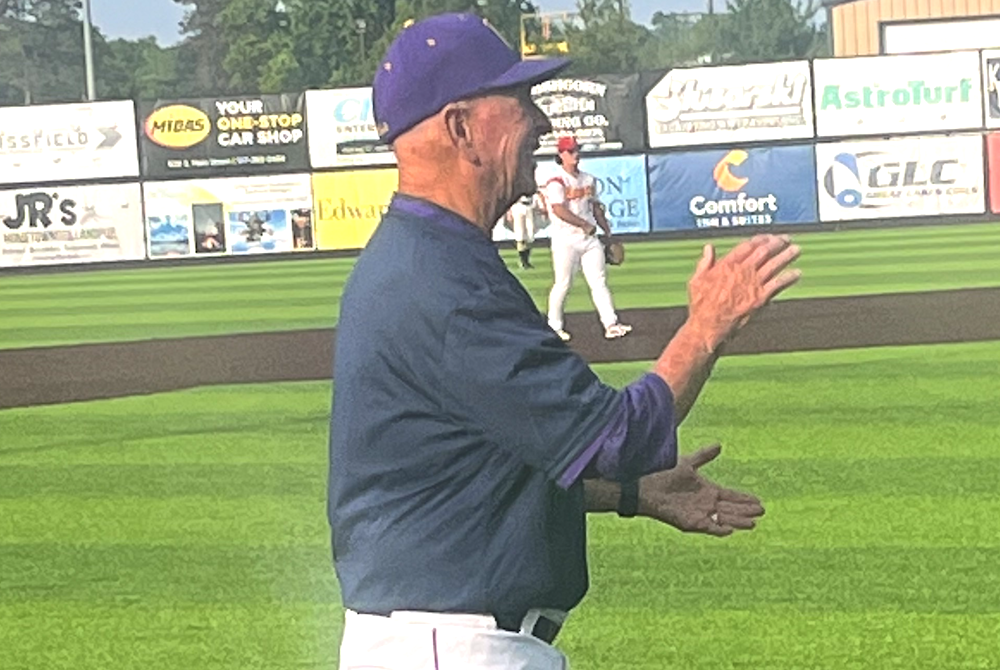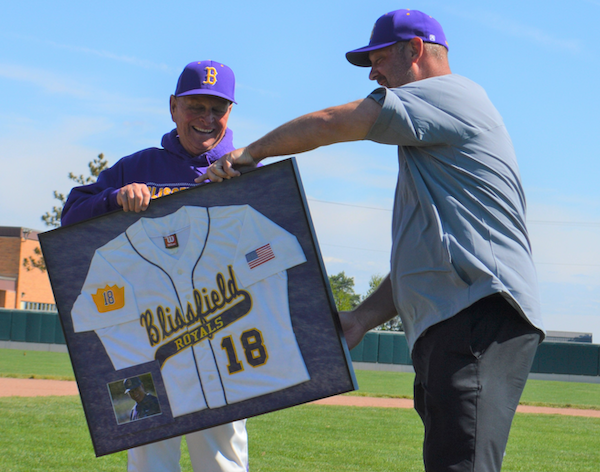
Schools Continue to Manage the Heat
July 16, 2015
By Rob Kaminski
MHSAA benchmarks editor
It certainly was not the MHSAA’s intent to spur the most historically frigid back-to-back winters the state has seen. Nor did the Association wish for one of the mildest summers in recent memory during 2014.
Seemingly, it’s just Mother Nature’s way of reading into MHSAA efforts for managing heat and humidity and acclimatizing student-athletes for warm-weather activities.
Since guidelines were put in place (recommended for regular-season sessions and required for postseason tournaments) before the 2013-14 school year, there have been relatively few days during which psychrometers have had to be implemented.
“The key is, we’ve got plans in place for when the climate returns to normal trends for return-to-school practices and contests in August and September, as well as early June events,” said MHSAA Executive Director Jack Roberts. “It is a bit ironic that there have been relatively few days since the guidelines were established that they’ve actually come into play.”
In a nutshell, the guidelines provide instruction for four ranges of heat index: below 95 degrees; 95-99 degrees; 99-104 degrees, and heat indexes above 104 degrees, with increasing precautions in place as heat indexes rise. An index above 104 calls for all activity to cease.
Certified athletic trainers Gretchen Mohney and James Lioy agree that recent requirements in heat and hydration guidelines are a step in the right direction and encourage that – when possible – an athletic trainer oversee the implementation. Simply taking a reading from just outside the AD’s office or at home does not simulate on-site conditions.
“This doesn’t take into account the radiant heat at the site, which can drastically affect the conditions that athlete plays in. It is essential that all parties involved in making decisions to play collaborate with one another,” Mohney said.
Heat-related deaths in athletics rank only behind cardiac disorders and head and neck injuries, but such fatalities might lead the way in frustration for families and communities of the victims. The reason? Heat-related illness is totally preventable.
Another source of mild frustration is the lack of recording within the state for those practice and game situations which warrant heat protocols.
When the Representative Council was formulating the Heat and Humidity Policy, it was also mindful of ways in which the MHSAA could assist schools in putting the plan into practice. Coaches, athletic directors and trainers needed a method to record information for athletic directors to view and for the MHSAA to track. The MHSAA developed interactive web pages on MHSAA.com which allow registered personnel to record weather conditions as practices and contests are taking place, using psychrometers.
Additionally, discounted Heat and Humidity Monitors and Precision Heat Index Instruments are offered to schools through a partnership between the MHSAA and School Health.
Yet, since the availability of such tools came to fruition two years back, fewer than 1,000 entries have been recorded, and many are multiple entries from the same schools.
Of the 772 entries, only 15 took place when the heat index was in excess of 104, while just 21 indicated an index of greater than 100. Cooler temperatures could be playing a factor in the overall number of participation, particularly in the northern areas of the state.
Nearly all of the responses came during fall practices, with a few isolated cases coming during the spring.
As Mohney pointed out, all resources must be properly used in concert with one another to achieve desired results.
Reminders of the tools available to schools are disseminated throughout the state each summer.

Baseball Remains Front of Tuttle's Mind, Close to Retired Coach's Heart
By
Doug Donnelly
Special for MHSAA.com
June 29, 2023
BLISSFIELD – Larry Tuttle jogged out of Tuttle Dugout onto the artificial turf at Adrian College and took his spot in the third base coach’s box, looked in at the batter as he approached the plate and clapped his hands.
It’s like he never left.
For more than 50 years, Tuttle occupied the third base coach’s box for the Blissfield Royals. He is the winningest high school baseball coach in Michigan history and one of the winningest prep baseball coaches in America. It’s been two years since Tuttle last coached the Royals, but when the Lenawee County All-Star Game came around this year, and Onsted coach Matthew Randall was named a head coach of one of the teams, one of his first calls was to Tuttle.
“To see him coach third base again for two innings of that all-star game was nothing short of amazing,” Randall said. “I love that man and everything he has taught me.”
Tuttle and Randall faced off about 40 times over the years.
“There’s a lot of respect between us,” Tuttle said. “I was happy to do it.”
Tuttle, 79, is a Morenci native who played baseball and graduated from Adrian College, coached for one year at Temperance Bedford and five decades at Blissfield. He spends a little more than half of the year in Florida these days in a house he owns in The Villages, a retirement community about an hour north of Orlando.
This past spring, Blissfield took a spring baseball trip to Florida and Tuttle was able to come out to the field and watch a few practices.
“That’s the best time,” he said. “I always enjoyed those first practices of each season. People will ask me, ‘But what about the cold? It’s always so cold in Michigan that first week.’ The first 10 days or two weeks or so inside, that’s where we formed our whole season, working on the fundaments and the strategy, getting the kids mentally ready for the season. That was a fun part of coaching.”
He returns home to Michigan each summer to spend time with his kids and grandchildren, including a freshman-aged granddaughter who is showing good things in softball. His roots are in southeast Michigan, and he has every intention of keeping it that way.
 Tuttle’s career at Blissfield was nothing short of remarkable.
Tuttle’s career at Blissfield was nothing short of remarkable.
He coached Blissfield for 54 seasons. It would have been 55, but the 2020 season was canceled due to COVID. The Royals won 1,332 games during his career. They won 33 District titles, 23 Regional championships and seven Finals crowns. Blissfield also won 40 league titles, including in his final season of 2021. His No. 18 jersey was retired by the school district.
In 2015, Tuttle was an easy inaugural choice for the Michigan Baseball Hall of Fame.
This summer, Tuttle returned to Michigan in time to see Blissfield play a few regular-season games and was there when his beloved Royals played in the Division 3 District tournament. He wore his familiar Royals gear. When the Lenawee County All-Star game was played, Tuttle was in his full Blissfield uniform. It still fits perfectly.
“I still enjoy the game,” Tuttle said. “It’s my energy level that just isn’t what it used to be. That’s why I stepped down. I still love the strategy of the game.”
When he’s watching a game, he still goes through every play in his mind and what he would do if he was calling the shots.
“You’re always coaching even though you might a spectator,” he said. “It may not be the right way, but it’s my way. That’s baseball. I love thinking about what to do on this count or that count, to take a pitch or not.
“I see a lot of coaches these days who had played in college. Young coaches coach the college way, but you are dealing with high school kids who may not have a real firm understanding of the game itself. You have to teach high school baseball to college kids. You don’t teach college or pro ball to high school kids.”
Tuttle, who has battled some health issues the last couple of years, misses being in his role as coach.
“I miss the players and the relationships I had with umpires and the other coaches,” he said. “It’s hard to replace that.”
Tuttle is an icon in Lenawee County. When he goes to a game, people gather around him to talk. He still follows the area teams and has a relationship with several coaches and ex-players.
Tuttle enjoyed monumental success at Blissfield. The Royals’ last sub-.500 season was in 1971.
“I know that because I have the records,” Tuttle said. “The closest we came was we were 8-8 one year in the 1980s.”
Tuttle has been a stickler for stats his entire career. Some coaches have a hard time remembering how their team did two years ago. Tuttle knows. He kept intricate stats on every team he’s coached at Blissfield and to this day has them organized only a few steps away from his kitchen table at his home in Blissfield – which is just across the street from the high school and a long home run away from the baseball field that is named in his honor.
“I have a file cabinet full of files from each season and I have the scorebook from every year I coached at Blissfield, starting in 1968,” Tuttle said. “Stats were always important to me, not the wins, but the stats. Baseball stats tell you so much about the game.”
Since stepping aside, Tuttle has had time to reflect on his career.
“I would have never believed I would have coached that long,” Tuttle said. “Then, I sit back and think, ‘That was a lot of wins, wasn’t it?’ I don’t mean that in a bragging way. I think more about it when I go to a game.”
Randall recently announced his retirement from Onsted after 13 years as head coach. Onsted is in the same conference as Blissfield, the Lenawee County Athletic Association, so he had a close-up view of Tuttle in action.
He now has a memory of the last game he coached at the All-Star Game at Adrian College.
“I credit a lot of my coaching philosophy to this day to him,” Randall said. “Our relationship has really grown over the years. I wanted Coach Tuttle to be with me in my final game. That’s why I asked him.”
PHOTOS (Top) Retired Blissfield baseball coach Larry Tuttle coaches third base during the June 26 Lenawee County All-Star Game. (Middle) Tuttle’s jersey is retired during a 2021 ceremony. (Photos by Doug Donnelly.)

